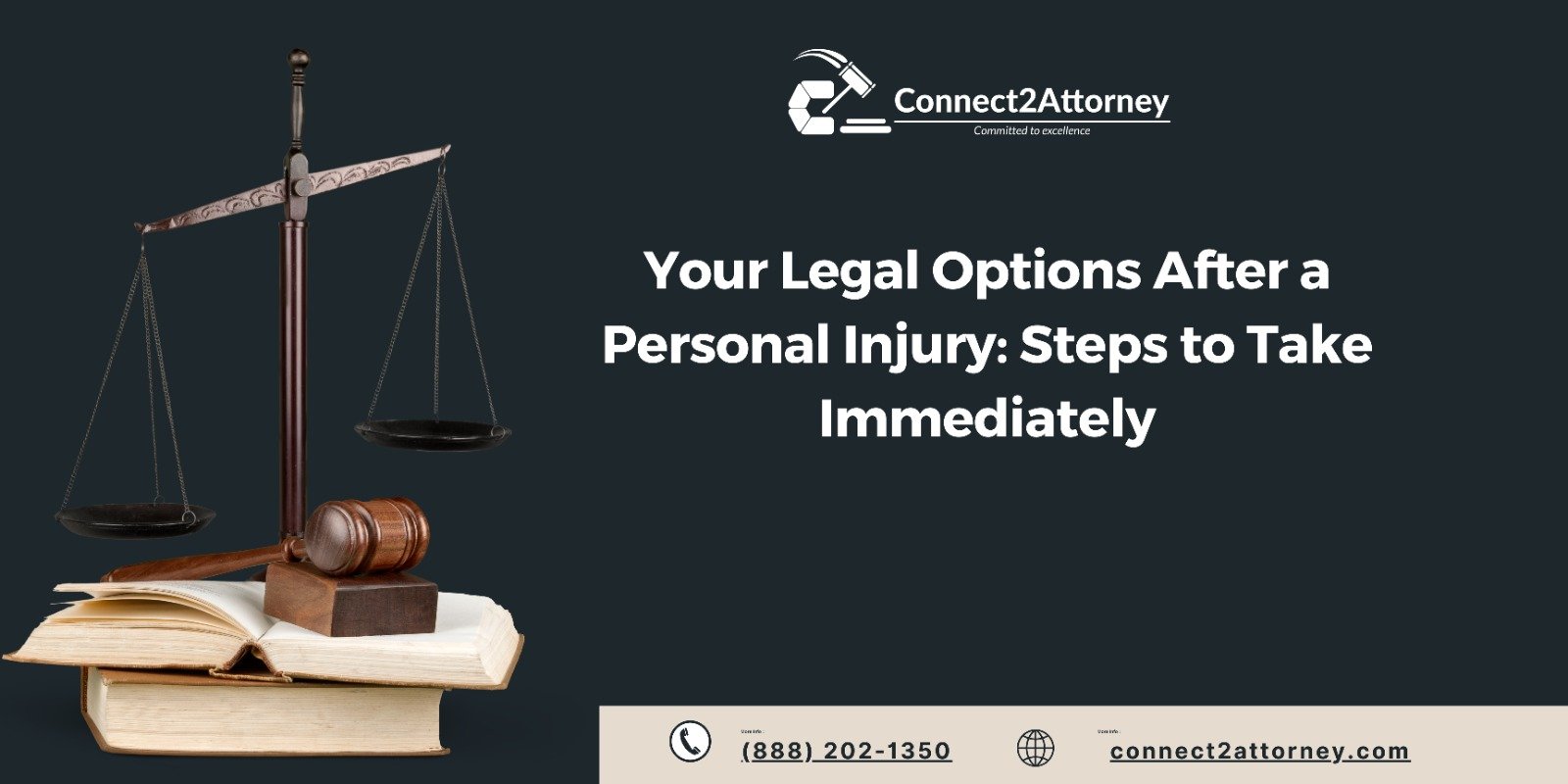Your Legal Options After a Personal Injury: Steps to Take Immediately
 Experiencing a personal injury can be life-altering, often leaving individuals overwhelmed by medical bills, lost wages, and emotional distress. Whether you’ve been injured in a car accident, a workplace incident, or due to a defective product, understanding your legal options is crucial to safeguard your future. Acting quickly and strategically can make a significant difference in the outcome of your case. This guide outlines actionable steps to take immediately after a personal injury, helping you navigate the process effectively.
Experiencing a personal injury can be life-altering, often leaving individuals overwhelmed by medical bills, lost wages, and emotional distress. Whether you’ve been injured in a car accident, a workplace incident, or due to a defective product, understanding your legal options is crucial to safeguard your future. Acting quickly and strategically can make a significant difference in the outcome of your case. This guide outlines actionable steps to take immediately after a personal injury, helping you navigate the process effectively.
- Seek Medical Attention Without Delay
Your health should be the top priority after any personal injury. Prompt medical attention not only ensures you receive the care you need but also creates a detailed record of your injuries. This documentation is critical if you decide to pursue a claim later. Even if you believe your injuries are minor, seeking an evaluation from a medical professional can uncover hidden issues.
- According to a report from the National Safety Council in September 2024, delayed medical treatment in personal injury cases can lead to a 30% reduction in the likelihood of full compensation due to insufficient documentation.
- Report the Incident and Document Evidence
Filing an official report with the appropriate authorities or entities is essential. For example:
- Car Accidents: Contact law enforcement to file an accident report.
- Workplace Injuries: Notify your employer immediately and complete an incident report.
- Product-Related Injuries: Contact the manufacturer or seller and keep the product intact for inspection.
Take photographs of the accident scene, your injuries, and any relevant details. Collect contact information from witnesses and preserve physical evidence. Thorough documentation strengthens your case and ensures nothing is overlooked.
- Understand Your Legal Rights
Each state has its own personal injury laws, including statutes of limitations and comparative fault rules. Consulting an attorney early in the process helps you understand these nuances and ensures you meet all deadlines.
- In August 2024, several states, including California and Texas, updated their statutes of limitations for personal injury claims involving toxic substances, extending filing deadlines by up to two years. This change allows more victims to seek justice.
- Avoid Communicating with Insurance Adjusters Alone
Insurance companies often attempt to settle claims quickly and for as little money as possible. Avoid providing recorded statements or signing any documents without consulting an attorney. An experienced lawyer can help you navigate negotiations, ensuring you don’t unintentionally undermine your case.
Tip: Retain copies of all correspondence with insurance companies to avoid miscommunication.
- Evaluate the Need for Legal Representation
Certain scenarios demand legal representation, such as:
- Severe Injuries: Cases involving long-term disability or extensive medical treatment.
- Workplace Injuries: Especially if your employer disputes the claim or retaliates against you.
- Defective Products: When harm results from dangerous consumer goods.
A Consumer Product Safety Commission report from October 2024 highlighted a 15% increase in injuries linked to faulty household appliances. Victims in these cases often face legal complexities that require expert guidance.
- File a Claim Promptly
Initiating your claim promptly ensures access to key evidence and witnesses while the incident is still fresh in their minds. A personal injury claim may include compensation for:
- Medical expenses (both current and future)
- Lost wages and reduced earning capacity
- Pain and suffering
- Property damage
- Consider the Possibility of Settlement or Litigation
Most personal injury cases are resolved through settlements. However, if a fair agreement cannot be reached, litigation may be necessary. Your attorney will guide you through the decision-making process, weighing the pros and cons of each option.
- The Role of Legal Representation in Personal Injury Cases
A skilled attorney can simplify the complexities of your case by:
- Gathering evidence and expert testimony
- Negotiating with insurance companies
- Representing you in court, if necessary
Choosing the right legal representation is crucial. An attorney experienced in personal injury law will advocate for your best interests, ensuring you receive the compensation you deserve.
- Stay Informed About Legal Trends
Personal injury laws and legal precedents are constantly evolving. Staying updated ensures you understand your rights and the latest avenues for seeking justice.
- In September 2024, the U.S. Department of Labor announced stricter regulations to protect workers from occupational hazards, emphasizing employer accountability in injury claims.
- Steps to Take If Harmful Products Are Involved
In cases of injury caused by defective or harmful products, additional steps may be required:
- Retain the product in its original condition.
- Gather purchase receipts or warranty documents.
- Consult a product liability attorney to explore your options.
A class-action lawsuit filed in July 2024 against a major pharmaceutical company revealed critical failures in product testing, highlighting the importance of legal action in such cases.
Take the First Step Toward Justice
Navigating the aftermath of a personal injury can be daunting, but taking the right steps immediately can strengthen your case and increase the likelihood of fair compensation. Whether you’ve suffered due to a workplace incident, a car accident, or a defective product, understanding your legal options is key to protecting your rights.
For expert guidance tailored to your situation, visit Connect2Attorney. Their experienced team is dedicated to simplifying the legal process and helping you secure the justice and compensation you deserve.








